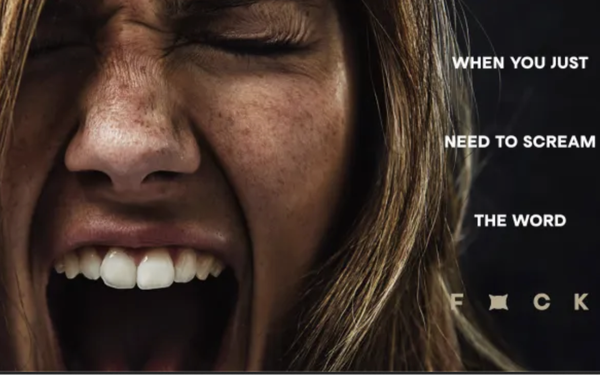
My sample of the Shoutlet
arrived at my house last Thursday, just in case I wanted to scream at the ghosts and goblins parading by on Halloween night.
But this small (8 x 6 x 2 inch) pillow, touted as a “portable
voice suppression device made for shouting,” has been especially useful to relieve stress during election week.
Brent Drake, the product’s inventor, is much more focused on the
holiday season, however.
The holidays can be a time of great tension, so why not “ground yourself through muted vocal expression,” Drake explains to Pharma & Marketing
Insider. “You can scream, yell, or even cry into this pillow without the fear of disturbing anyone.”
When we spoke with him last week, Drake had already sold nearly 2,000
Shoutlets in a two-week period since the product’s launch, and plans to have close to 20,000 units ready for shipping in the weeks ahead.
advertisement
advertisement
Drake, who has self-funded the
Shoutlet and its parent company Powershout, comes from a marketing background (he currently also serves as head of marketing for erectile disfunction telehealth company Rugiet) and is planning to
support the Shoutlet’s holiday push with “traditional digital advertising” over TikTok, Meta and Twitter. The target audience: 25- 44-year-old females who are “health and
wellness enthusiasts.”
That audience was borne out through market research.
“I wanted to make it a tool for golfers, when you miss a putt or you shank a drive, you shout
and yell it out, and then keep going, but that didn’t move the needle in any market research test,” he admits. “What did move the needle were women who were somatic breath
enthusiasts, into tantra yoga, anything around self-expression.”
Initial orders through crowdfunding website Indiegogo, meanwhile, have been unexpectedly heavy with people who are
“neurodivergent in some form or fashion,” such as having ADHD. This unexpected audience has been brought in largely through a viral video from an influencer who discovered the
Shoutlet on Indiegogo.
That incident backs up Drake’s use of Indiegogo not as a fundraising device, but as his prime marketing and sales tool up to now.
Indiegogo, he explains,
brought in initial orders and also enabled him to “build a very strong community and get more or less free marketing.”
“If the customers sees your ad and they’re
interested in your product, they pay one dollar and that gives them a reservation for a 50-off special discount when the company launches,” he continues. “Over two or three months, I was
able to collect about 3,000 reservations. Midway through Indiegogo, we started shipping.”
Drake describes the Shoutlet as “one simple, low-cost easy tool that allows you to at
least somewhat alleviate the stress, anxiety that you’re feeling in a given moment.”
But Powershout is not stopping there.
Drake has a complete pipeline of products in the
works, as he works to develop what he terms a “new category in health and wellness around shouting.”
These planned products include “throat sprays or serums” (“if
you go from not shouting to shouting all the time, you’re going to have some issues with your vocal cords”), tea, drops. Nebulizers, tongue scrapers (“when you shout and yell, you
start collecting things in the back of your tongue”) and even a spirometer, akin to those used by COPD patients (“you blow into it and it measures the health of your lungs”).
“The premise of Powershout,” Drake says, is to “get people shouting and understanding how healthy their lungs are, understand how loud their screams can be, how loud their shouts
can be, what decibel level you can reach.”
Along those lines, Drake is preparing for a possible marketing activation around the SXSW Music Festival in March where he says Powershout
would reintroduce the World’s Scream Competition, which “used to be somewhat popular and then just disappeared…You see who can scream at the loudest decibel.”
The
winner gets a prize, and audience members, thankfully, would get earplugs.
All joking aside, though, shouting and screaming is hardly a new therapeutic idea, though Drake stresses that the
Shoutlet is not a medical device (“we’re just trying to provide people with a very quick real-time avenue to regulate their stress or anxiety levels”).
Far removed from
primal scream therapy, used to treat core traumas, plain old screaming is a key part of many self-help programs, as Drake discovered a few years back when he was on a “binge” of retreats
and therapy sessions,
That led him to seek an everyday outlet for releasing anxiety and tension.
“We’re designed to scream,” he says, noting that humans before
technology used to communicate with each other “in the forest or the mountains” by shouting. “It makes us feel better. It’s free. We’ve got to have a better avenue to
allow people to scream at the top of their lungs on a regular basis the way that they were designed to do.”
He found that existing products “didn’t really suppress the
decibel levels. But “if I just grabbed my pillow off my bed, or rolled up a towel, that worked out well. But I didn’t want to carry my pillow to work or in the car.”
Then, on
a camping trip, he rolled up some T-shirts that he had used as a pillow and had “one of those light bulb moments. All I need to do is make a small, dense pillow.”
Thanks for
that inspiration, Brent. I’ve got a sore throat from screaming so much from the election results -- and will leave it at that while I find some throat drops.